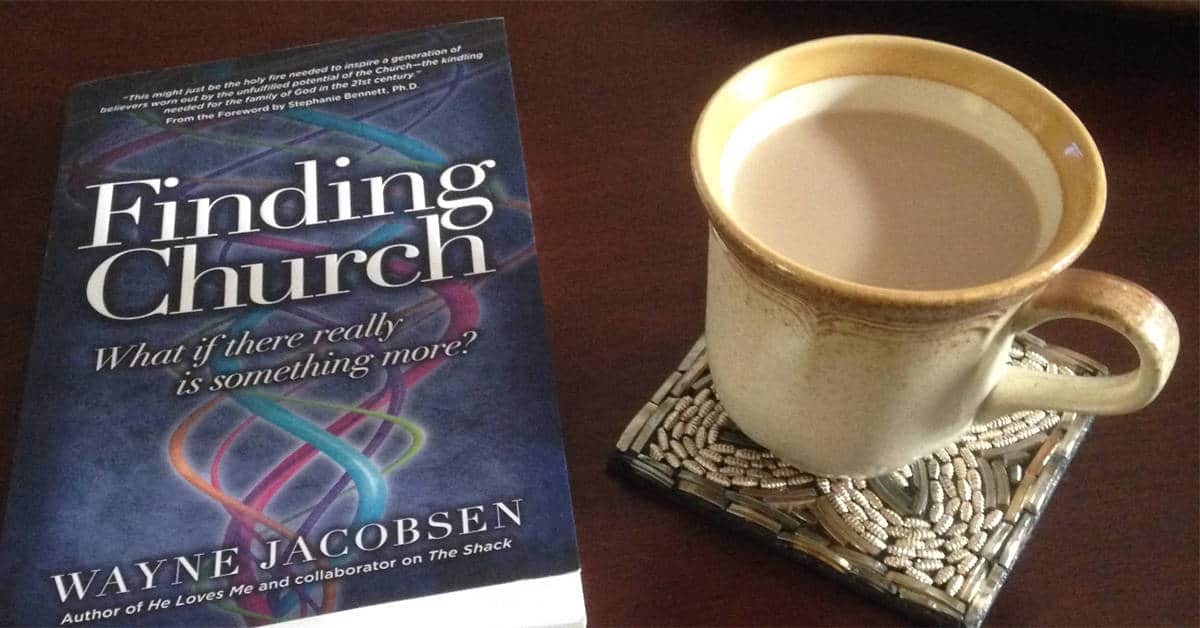Sara and I have just begun a fresh reading through Romans to hold what we’ve been learning about trauma and sin up to the light of Paul’s understanding of redemption.
In the first chapter, Paul mentions “the righteousness that comes by faith,” which is the theme of the entire book—how God does by grace what human effort could never achieve. I’ve taught this book many times throughout my life. On this read, it became clear to me how much the meaning of that phrase has changed over time. Truth, it seems, has a trajectory. It’s not a set of facts we come to believe, as if we could clearly see all its implications from the outset. Instead, Truth is the reality we come to embrace over time as Jesus continues to reveal himself and his light to us.
Reflecting on our journey with that phrase provides an interesting roadmap for the fascinating adventure Sara and I have shared.
In my younger days, I would have interpreted that phrase to mean “the good deeds that come from ‘the’ faith.” I would have seen faith as the total of the New Testament rituals and principles I believed and tried to implement. My focus was on my obedience to a list of New Testament expectations. Looking back, I wouldn’t say it led me to more righteousness but more of an appearance of righteousness. I learned how to act better, especially when I was being watched, but doing so only drove the unrighteousness deeper as it found refuge in “righteousness indignation” or “religious arrogance.” Both can be so easily justified as they provide the excuse we need to live a loveless life.
In my twenties and thirties, I would have interpreted that phrase as “the perfection that faith should produce.” This meant the perfection of my actions was the tool I used to evaluate the quality of my faith in God. In my more honest moments, every sin or failure became a source of condemnation and the constant demand for me to try harder. In moments of cognitive dissonance, I would find comfort in the fact that I was working harder than most other Christians I knew as if Jesus were judging on the bell curve. Again, the fruit of that was not righteousness but simply me trying harder to meet God’s standards.
In my mid-forties and early fifties, I would have interpreted that phrase, “Trusting God is the righteousness he seeks.” Some of what Paul says elsewhere underscores this. “Abraham believed God, and it was counted to him as righteousness.” So that was better but still not complete. While there was no shame in it nor any call to perform better, it still didn’t allow me to recognize the transformation God wanted to do in my heart. My alleged faith became a cheap substitute for how he invited me to live rightly with myself and others instead of being the source of that transformation.
For the last twenty years, I have come to interpret that phrase as, “the whole-hearted living that results from my growing trust in Father’s love.” Rather than being an oppressive obligation God puts on us, righteousness is the essence of the freedom to be all God created me to be. I make my better decisions in his wisdom when I am at rest in him instead of striving. Growing trust does produce growing freedom. It not only seeks to untwist me from the distorting of darkness but also engages me with God’s purposes unfolding in the broader world. In my struggles, I’m less bogged down by my well-being and am increasingly aware of how he is loving me and the people around me. Though his way may mean greater pain in the short run, it leads me to a better way to deal with the uncertainties of life. It reminds me that my work is not trying to act more righteously but to find rest in his love and his work in the situations that confront me each day.
In each case, I would have used the exact phrase but applied it quite differently. Those who say, “I just believe what the Bible says,” don’t realize how often they interpret its words. We all do it, often in the vacuum of religious biases or our comfort. They can easily distort its meaning even as we claim to hold fast to the truth of Scripture. What we take Scripture to mean is always an interpretation. In the Jesus Lens, I said the most dangerous Christians in the world are those who don’t know they are interpreting the Bible and assume their interpretation is the only right one.
I have found that my interpretations of Scripture continue to change under the increasing light of his Spirit as he intersects with the reality of my life. How I have come to see “the righteousness that comes faith” in sharper focus over time has clarified its meaning for me. I can only wonder what insights this next decade might bring.
I love that my life is still being shaped by Paul’s words, confirmed by the continuing work of his Spirit in my heart. Seeing how those two line up has provided me the adventure of a lifetime as I awake each day with anticipation as to what he is still refining in my heart and mind.
__________________
Also of note—
The next gathering of the He Loves Me Book Discussion, which will take place on Saturday, November 11, at 1 p.m. Pacific Time. You can find the link for this conversation on the Group Page on Facebook, or if you are not a member of Facebook, you can write me for a link. These conversations are held and recorded on Zoom. We stream them live on my Facebook Author Page for those who don’t want to be in the Zoom discussion, and you’ll find our previous conversations there.
This week, we’ll cover Chapters Six and Seven: “The Tyranny of the Favor Line” and “What Shall I Give to God.” Each of these further breaks down the futility of trying to earn God’s favor with our good works or gifts and invites us into the depth of his love that overcomes all our need to perform.
If you’ve missed previous chapters you can find them here:









Pingback: The Trajectory of Truth | Lifestream – The Faith Herald
I’ve been married 32 years or something like that. I said to my wife the other day that I thought maybe we should get a divorce. I told her that I love her and that I would always love her in the same way, but the contract of marriage no longer meant anything to me so maybe we just remove it and carry on. Up to this point I really felt like we were on the same page with the “heart of things” in our relationship, but I was shown otherwise lol. She was upset, the life I had always seen in her eyes was gone, she was shocked and confused, and after a bit of thought, she said, “if you think we should get a divorce-then we have nothing and we are done.” Now I was the one who was shocked and confused; I had told her I loved her, that I would always love her, that nothing relationally between us would change, only the removal of a symbolic contract, how could this create such a tension between us? Wayne, how could this create such a tension between us? (The answer is hidden in plain sight in what you wrote in your post.)
Contracts and covenants are symbols of a reality, even words and basic language just symbolize reality. But the only thing that is important to the HEART and SPIRIT is the reality. So what is the reality? What is the truth? My wife, like most people has her faith in the visual and the audible symbols representing reality and in this case was totally blinded by them to the point that without them, our relationship, was nothing, we have nothing, together we are nothing.
I wanted to dialogue more with her, I wanted her to see, to understand, to be free from the symbolic nature of humanity and enter into and live in the reality of SPIRIT with me. I guess the bottom line is without the symbol she could not trust. Was it me she could not trust? In any case when the music faded and all was stripped away, there was nothing between us… .
Rather than continue on with this valuable teaching time (tongue in cheek), I knew in that moment what must be done for the time being, I gave her a dose of reality, no more words, and I wrapped her up in my arms. It didn’t matter that she didn’t understand, the lesson was not lost on me, I understood. I recognized how easy it is for us humans to live uncomfortably and insecurely in a place of noisy symbolism, of words, and of the pursuit of definition and knowledge, while foregoing the comfortability of the reality of the FULLNESS of the love of God by Spirit, which we have also been given. This reality is so much deeper than words, only Spirit to Spirit can reveal it.
The righteousness that comes by faith….what exactly does it mean to me today? It means that when we are wrapped up in arms of love, our default WILL be to wrap up others in arms of love by nature/reality, and not through learnedness or premeditation. 1 John has much to say about this. It’s not a matter of should, but if you are, then you will. And if you will, you will experience perfect peace which can become a perpetual reality moving forward.
Maybe your aspirations were beyond her capacity, to use some recent podcast terminology. The covenant may have not meant anything to you but obviously it spoke volumes to her. Incarnation invites us to communicate in the terms of our hearer, not in the terms that make me most comfortable. I get what you’re saying, certainly, but she didn’t seem to. I hope you guys find a great way to navigate around the terminology disconnect here.
lol, yes we are good. I run a quick processor, while hers is slower, and more methodical; it’s a great combination as long as the quick processor doesn’t get too rammy lol.
Good to hear. It sounded like you threw her for a pretty big loop there!
I sure did, and I threw myself for a loop. The freedom of Heart and Spirit living vs the bondage of flesh/mind obligation/guilt living has been a frequent conversational topic around here. It’s how I live, it’s what I follow, it’s how “I lead”, it’s what has brought us to incredible and uncommon opportunity, space, and freedom in the day to day. I thought we were doing it in-step, together which I think was comforting to me, it was a confirmation or validation of us, together, in like-mind and spirit. Now I’m not sure if she’s just been humoring the conversation and just being a good soldier, or we are as spiritually aligned as I thought and I just lost her in the language. I don’t want to lead, and I don’t want followers, I just want to live in-step naturally and spiritually, but I think she’s content to follow my lead, while I would prefer her to be free, beside me. In any case, we are good, we are loved, we love each other, and I, I think it best for me to let my words be few, and just keep rolling along regardless of who gets what.